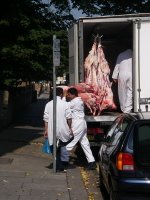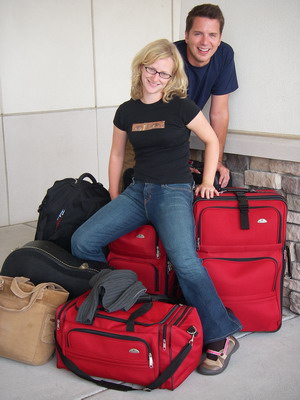But the real challenge to the young couple with six higher education degrees between the two of them...

Still, the halal lamb chops look extremely promising and we got a splendid omelette pan today which, with enough careful coaxing, should double nicely as a lamb-chop-sauteing pan. Traveling cooks can't be too fussy about these things, however shocked Escoffier might be.
Halal?
Yes, halal. Presumably excepting the Scottish butcher a block or so west of here, our local butchers keep it real.
 There are a number of different interpretations regarding what makes meat halal, which means, literally, “permitted”. The most rigorous requirements are for what is called dhabiha halal, under which the meat must not be or include any substances forbidden by the Quran (most notably pork, blood and alcohol, but also including animals found dead, frogs and “fanged beasts of prey”) and must have been slaughtered by a mentally sound adult Muslim. This person is required to check the animal for health and wellbeing, give it a last drink of water before slaughter, and then align it so that it is facing Mecca. He then kills it by slicing its neck arteries, esophagus and trachea with a non-serrated knife while reciting an invocation, usually the famous phrase bismillah al rahman al rahim, “in the name of God the Beneficent, the Merciful,” to demonstrate that the animal is submitting to its place in God’s design.
There are a number of different interpretations regarding what makes meat halal, which means, literally, “permitted”. The most rigorous requirements are for what is called dhabiha halal, under which the meat must not be or include any substances forbidden by the Quran (most notably pork, blood and alcohol, but also including animals found dead, frogs and “fanged beasts of prey”) and must have been slaughtered by a mentally sound adult Muslim. This person is required to check the animal for health and wellbeing, give it a last drink of water before slaughter, and then align it so that it is facing Mecca. He then kills it by slicing its neck arteries, esophagus and trachea with a non-serrated knife while reciting an invocation, usually the famous phrase bismillah al rahman al rahim, “in the name of God the Beneficent, the Merciful,” to demonstrate that the animal is submitting to its place in God’s design. Other, more lenient, interpretations suggest that as long as the meat does not include the forbidden substances, reciting the “bismillah” invocation before consumption is sufficient to qualify it as halal. A still looser interpretation holds that any food, whether forbidden or not, is halal after this recitation. We are as yet unsure about which definition of halal is the one to which the butchers on the Uxbridge Road adhere.
Other, more lenient, interpretations suggest that as long as the meat does not include the forbidden substances, reciting the “bismillah” invocation before consumption is sufficient to qualify it as halal. A still looser interpretation holds that any food, whether forbidden or not, is halal after this recitation. We are as yet unsure about which definition of halal is the one to which the butchers on the Uxbridge Road adhere.
It should be noted that the Quran explicitly states that the rules of halal may be ignored in situations where hunger threatens the believer. Another point of interest is that the rules governing kosher meat, while not identical to those of halal, are similar enough that some Islamic leaders have suggested that kosher meat is an adequate substitute for halal meat.
Incidentally, the chops got pan seared and served with oven roasted potatoes and a garlicky tomato salad.







1 comment:
Sounds tasty AND observant
Ed
Post a Comment